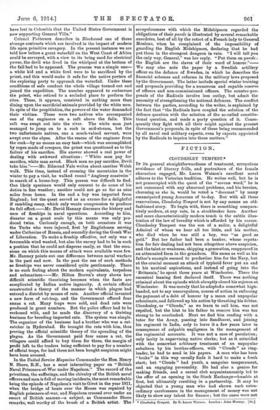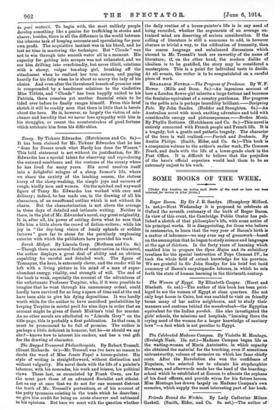FICTION.
CLOUDESLEY TEMPEST.* TN its general straightforwardness of treatment, scrupulous avoidance of literary frills, and portraiture of the female characters engaged, Mr. Lacon Watson's excellent novel adheres to the Victorian tradition. He writes well, but he is not preoccupied with the quest of the " sovran word," he is not concerned with any abnormal problems, and his heroine, charming as she is, would be voted a " doormat " by many emancipated young Amazons of to-day. Bet with all these reservations, Cloudesley Tempest is not by any means an old- fashioned story. To begin with, there is something compara- tively modern, at any rate, in a stockbroker hero. Another and more characteristically modern touch is the subtle illus- tration of the law of heredity which is afforded by his career. Cloudesley Tempest was the son of a sailor, a delightful Admiral of whom we hear all too little, and his mother, who died when he was still a boy, was "as good as gold." But her father had been a banker, whose reputa- tion for fair dealing bad not been altogether above suspicion, and the taint or weakness, skipping a generation, reappeared in an attenuated form in the grandson. His name as well as his father's example seemed to predestine him for the Navy, but at the crucial moment an attack of typhoid fever put an end to his nautical aspirations, and instead of going into the ' Britannia,' he spent three years at Winchester. There the ancestral leaning first declared itself. There was nothing criminal about the episode which abruptly closed his sojourn at Winchester. It was merely that he adopted a somewhat high. handed, not to say unscrupulous, course of action in enforcing the payment of a debt of honour by a mean and unpopular schoolmate, and followed up his action by thrashing his debtor. Cloudesley, or " Clouds," as we learn to call him, was not expelled, but the hint to his father to remove him was too strong to be overlooked. Next we find him reading with a tutor for the Army, passing into Sandhurst, and joining his regiment in India, only to leave it a few years later in consequence of culpable negligence in the management of the regimental accounts. It was not a case of peculation; only laxity in supervising native clerks; but as it coincided with the somewhat arbitrary treatment of an unpopular subaltern by his brother-officers, with "Clouds" as ring- leader, he had to send in his papers. A man who has been "broke" in this way usually finds it hard to make a fresh start; but " Clouds " lied youth, a sanguine temperament, and an engaging personality. He had also a genius for making friends, and a casual club acquaintanceship led to the offer of an opening in the Stock Exchange—humble at first, but ultimately resulting in a partnership. It may be objected that a young man who had shown such extra- ordinary carelessness in the management of money was not likely to show any talent for finance ; but the cases were not
• CImadesieg Tempest. By E. Lacon Watson. London John Murray. [6s.] in part materid. To begin with, the most unlikely people develop something like a genius for trafficking in stocks and shares; besides, there is all the difference in the world between the irksome task of keeping accounts and speculating for your own profit. The acquisitive instinct was in his blood, and he lost no time in mastering the technique. But " Clouds" was not to win through into smooth water all in a moment. His capacity for getting into scrapes was not exhausted, and we see him drifting into overfriendly, but never illicit, relations with a showy, vulgar tea-shop girl, breaking off the attachment when he realized her true nature, and paying heavily for his folly when he is about to marry the lady of his choice. And even after the threatened breach-of-promise case is compounded by a handsome Belgium to the vindictive Miss Tibbits, and "Clouds" bas been happily united to his Patricia, there remains yet another financial crisis to be tided over before he finally ranges himself. From this brief sketch it will be readily seen that there is little that is heroic about the hero. He is, however, so largely the victim of mis- chance and heredity that we never lose sympathy with him in his struggles, or resent the counterstrokes of good fortune which extricate him from his difficulties.











































 Previous page
Previous page